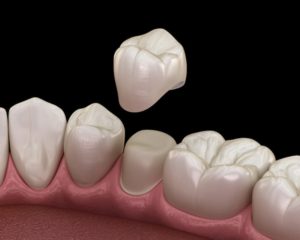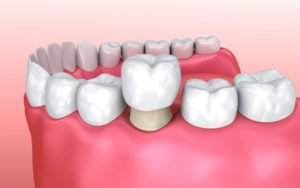Dental crowns are a common and effective way to restore damaged teeth. They are designed to cover and protect a tooth that is weakened, cracked, or otherwise in need of repair. While dental crowns are meant to last for a long time, it is possible for a crown to fall off. In this article, we will explore the reasons why a crown might fall off, how to handle the situation if it does, and whether it’s safe to go without a crown.
Is It Common for Dental Crowns to Fall Off?

Dental crowns are strong and durable, but like anything else, they can sometimes come loose or fall off. It’s not extremely common, but it does happen. If a crown falls off, it doesn’t necessarily mean something went wrong with your dental work. In fact, several factors can contribute to this issue. Some of the main reasons why a dental crown might fall off include:
- Decay Around the Crown: If the tooth underneath the crown develops new decay, the crown can become loose. Decay can weaken the bond between the crown and the tooth.
- Wear and Tear: Over time, crowns can wear down from constant use, especially if you grind your teeth or chew hard foods. This wear and tear can eventually cause the crown to become loose.
- Poor Bonding: If the cement used to bond the crown to the tooth is of poor quality or wasn’t applied properly, the crown may come loose sooner than expected.
- Trauma: A blow to the mouth, such as from an accident or injury, can cause a crown to come off. While crowns are made to be strong, they may be dislodged if the impact is significant.
- Aging: As crowns age, the materials can become weaker, making them more prone to falling off. For example, crowns made of porcelain or ceramic can sometimes become brittle with time.
If your crown falls off, it’s important not to panic. In most cases, it can be reattached by your dentist or replaced if needed.
How Long Can I Go Without a Crown on My Tooth?
If your crown falls off, it’s important to seek treatment from your dentist as soon as possible. While it may be tempting to delay a visit, it’s generally not advisable to go without a crown for too long. Here’s why:
- Protection: A crown helps protect the underlying tooth from damage, decay, and sensitivity. Without the crown, your tooth may be exposed to harmful bacteria, which can lead to infection or further decay.
- Pain: If the crown falls off and leaves the tooth exposed, you may experience pain or sensitivity, especially when eating hot or cold foods.
- Tooth Damage: The exposed tooth is more vulnerable to additional damage, such as cracking or chipping. If left unprotected, it can cause further complications down the line.
If you can’t get to the dentist right away, you can temporarily protect the exposed tooth with over-the-counter dental cement, which can help hold the crown in place until your appointment. However, this is just a temporary solution, and you should still see your dentist as soon as possible.
Can I Eat if My Crown Fell Out?
If your crown falls out, you may wonder if it’s safe to continue eating. The answer depends on the situation:
If Your Tooth is Exposed:
- If the tooth is exposed and sensitive, you may want to avoid eating hard, crunchy, or sticky foods, as these can cause pain or damage to the exposed tooth.
- Stick to softer foods that don’t require much chewing, such as soup, yogurt, or mashed potatoes.
- You should also avoid extremely hot or cold foods, as these can trigger sensitivity in the exposed tooth.
If You’ve Temporarily Reattached the Crown:
- If you have temporarily reattached the crown with dental cement or if the crown is still in place but not properly secured, you should be careful when eating. Try to chew on the opposite side of your mouth to avoid dislodging the crown again.
- Avoid chewing hard foods, like nuts or ice, as they can cause the crown to fall off again.
In any case, it’s best to avoid eating in the area where the crown fell out until you can see your dentist. They can assess the situation and determine whether the crown can be reattached or if a replacement is needed.
How Easy Is It to Lose a Crown?

While crowns are designed to stay securely in place, it is possible to lose them. However, it is not always easy for a crown to fall off. Here are some factors that might increase the likelihood of losing a crown:
- Poor Oral Hygiene: If you don’t take care of your teeth and gums, plaque and bacteria can build up around the crown, which may weaken the bond between the crown and the tooth. This can make it easier for the crown to become loose.
- Grinding or Clenching Teeth: If you grind or clench your teeth at night (a condition known as bruxism), this constant pressure can wear down the crown and cause it to come loose over time.
- Eating Hard or Sticky Foods: Foods that are hard or sticky can put extra pressure on the crown, especially if you chew on the side of the mouth with the crown. Over time, this can contribute to a crown loosening.
- Trauma or Injury: A sudden blow to the mouth, such as from a sports injury or accident, can cause a crown to come off. Crowns may also come off more easily if they are already compromised due to wear or decay.
While it’s not necessarily easy to lose a crown, factors such as poor oral hygiene, trauma, and teeth grinding can make it more likely.
Can I Reattach a Crown Myself?
If your crown falls off, you might be tempted to try and reattach it yourself. While it’s possible to temporarily hold the crown in place, it is not advisable to permanently reattach it on your own. Here’s why:
- Temporary Solution: You can use over-the-counter dental cement to temporarily reattach the crown, but this is only a short-term fix. Dental cement can hold the crown in place for a few days, but it is not a permanent solution.
- Proper Bonding: Your dentist has the proper materials and tools to bond the crown securely to the tooth. Trying to fix it yourself might result in an improper fit, which could cause pain or damage to the tooth.
- Potential for Infection: If the crown is not properly reattached, bacteria can enter the exposed area, leading to infection or further damage to the tooth.
If your crown falls off, it’s best to contact your dentist as soon as possible. In the meantime, you can use dental cement as a temporary solution to protect the tooth.
What Should You Do If Your Crown Falls Off?

If your crown falls off, here are the steps you should take:
- Save the Crown: Keep the crown in a safe place and bring it with you to your dentist’s office. If the crown is damaged or broken, your dentist may need to create a new one.
- Clean Your Tooth: Gently clean the tooth underneath the crown with warm water and a soft toothbrush. Avoid using any harsh cleaning agents or scrubbing too hard.
- Protect the Tooth: If you can’t see your dentist right away, consider using over-the-counter dental cement to temporarily protect the exposed tooth. This can help keep the area clean and prevent damage.
- Avoid Eating: Try not to eat on the side where the crown fell off, especially if the tooth is exposed. Eating hard or sticky foods can cause further damage or pain.
- Call Your Dentist: Schedule an appointment with your dentist as soon as possible. They can assess the situation and determine whether the crown can be reattached or if a new one is needed.
Conclusion
While it is not common for dental crowns to fall off, it can happen for several reasons, including decay, trauma, or wear over time. If your crown falls off, it’s important not to panic. You can take steps to temporarily protect the tooth, but you should see your dentist as soon as possible. They will be able to assess the situation and determine the best course of action, whether that’s reattaching the crown or creating a new one. By following proper oral hygiene habits and avoiding habits like grinding your teeth, you can reduce the chances of losing a crown and keep your smile looking great for years to come.

